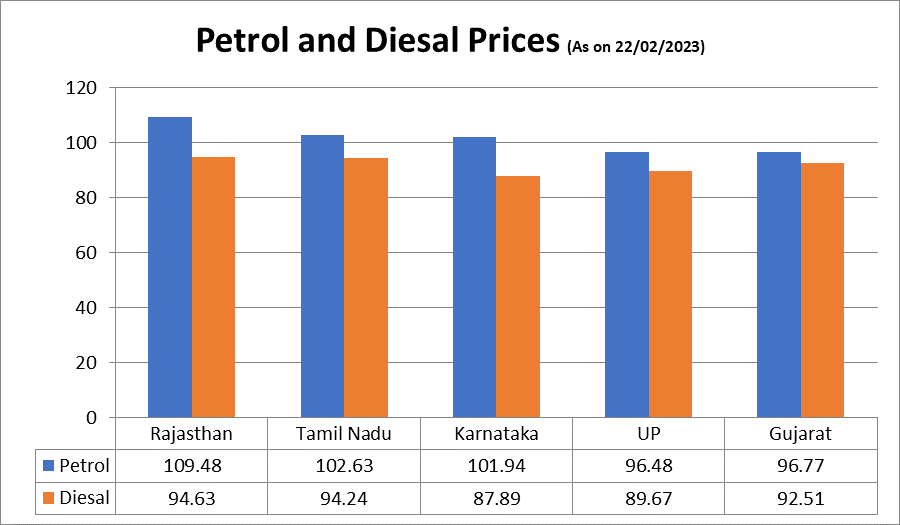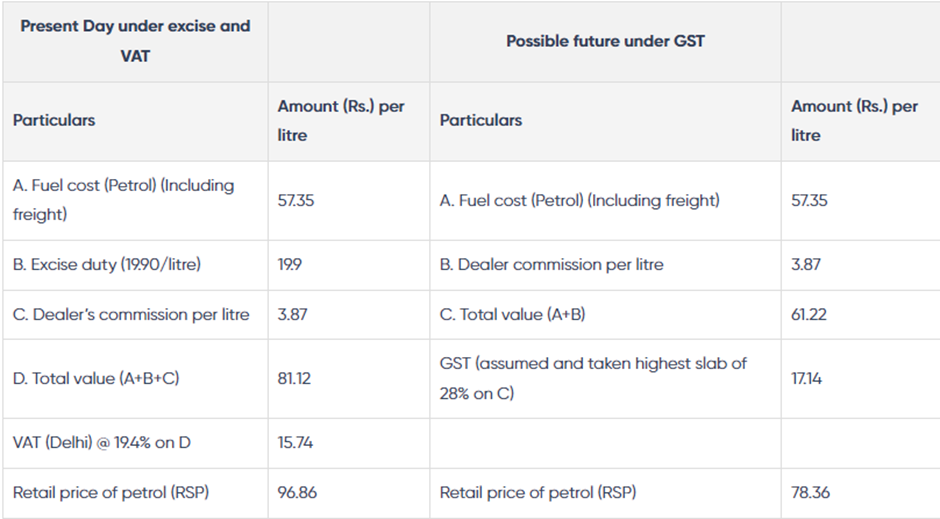HOW WOULD BRINGING PETROL, DIESEL UNDER GST LENS AFFECT COMMON MEN?
Jay Patel | 23 FEB 2023

Price of petrol can fall around 20% if it comes under GST !!
Currently, all of us experience brunt on high fuel prices in our daily
lives. From increasing travel expenses to high food and milk prices,
this all depends on price of petrol and diesel. India imports more
than 80% of Fuel from other countries including Russia, Iran, Saudi
Arabia and USA and thereby to limit imports and demand; government
imposes higher taxes on fuel price. This not only keeps demand in
check but helps to lower import bill. Currently, Central government
levies excise duty on price charged to dealers and then after adding
dealers commission, state government levies Value added tax (VAT) and
total of all this is retail price for a common men.
As there is disparity in taxes between centre and state government we
see different fuel prices in different states of India. Some states
like Rajasthan, Telangana, Tamil Nadu and etc imposes higher VAT and
as a result we see higher fuel prices in those states.

What factors Determines Fuel prices in India?
First and foremost determinant of fuel pricing is rate of crude oil
prices in international markets. Since crude oil price depends on its
highly volatile demand and supply, it becomes very hard to predict
crude prices. However, since past one year India started importing
crude oil from Russia at highly discounted prices as compared to past
years.
Secondly, India uses US Dollar ($) as base currency to buy crude from
OPEC and USA. Therefore, fluctuations in US $ against Indian INR would
also contribute towards its pricing. Third, Crude oil is imported by
Oil Marketing Companies (OMC's) and distributed to dealers. Thus, OMC
adds freight charges, refining cost of fuel, customs duty, import
parity price, refinery transfer price and so on. Then OMC distributes
to dealer after fixing some commission.
Fourth determinant would be taxes levied by centre and state. As
discussed above, there is in disparity in taxes between centre and
state. However, eliminating excise duty and VAT and bringing fuel
price under GST lens would clear out this discrepancy. However,
different state impose different VAT rates and because of this end
consumers are facing effects of higher inflation. In May 2022, the
central government reduced excise duty on petrol and diesel prices by
Rs.8 and Rs.6 respectively. This move was taken to cool down the
retail inflation and also complement the reduced monetary rates.
The need of Including Petrol, Diesel and Gases under the ambit of GST:
The price of petrol has risen above the ₹100-mark in major states
across the country and the government has cited the reason as rising
international crude oil prices. It should be noted that more than half
of the money paid by the consumer to purchase fuels goes towards some
tax or the other expenses like cess.
In my view, bringing domestic fuels under GST umbrella would not only
be beneficial to common men but it would also help to bring inflation
in check. There has been long demand to bring fuel under GST since its
introduction. But recently, our Finance Minister Nirmala Sitharaman
expressed central government willingness to bring petrol and diesel
under GST ambit, however centre cannot take sole decision as it comes
under purview of GST Council to determine its decision. Interestingly,
GST council comprises of Finance ministers of all states and it would
be very difficult to bring state government under same page.
To our knowledge, highest tax slab under GST is 28% and if petrol,
diesel comes under GST, maximum tax imposed can be 28% which far less
than current tax rate. Also, tax component would stand divided but
state government would lose its independent stature for deciding VAT
for fuel. Also, state government would have to be depended on centre
for getting back part of their dues. This would not only lower their
tax collection but also disturb states ongoing budgets and social
development programs.
Assuming, Petrol comes under GST, Let's see how prices would be
determined:
 Source: Cleartax
Source: Cleartax
From the above table, we can conclude that price of petrol can fall around 20% if it comes under GST. This fall can contribute to building immensely towards India's economic development as retail inflation would come under RBI's desired level, logistical cost for all commodities would fall and consumer would left with higher disposable income to spend. With rising disposable income, discretionary and non- discretionary spending increases, boosting jobs and overall economic development for all major sectors of economy.
Disclaimer: This article has been written by Jay Patel - Our Senior Research Analyst and originally published on Smart Investment website.